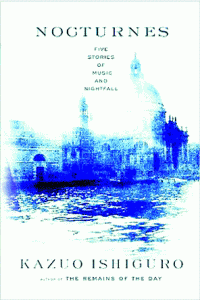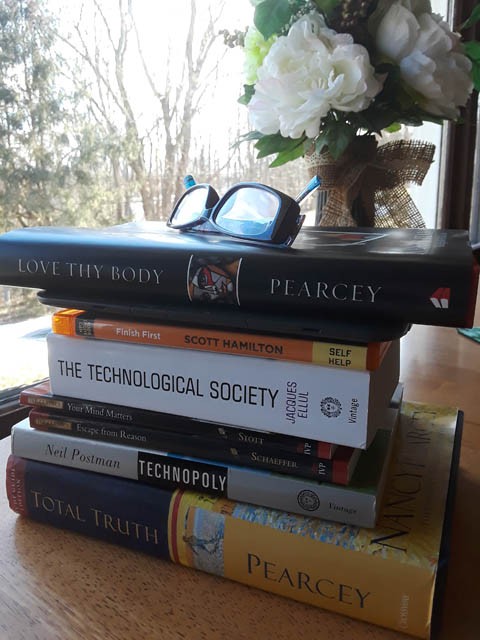Nocturnes
 Kazuo Ishiguro’s Nocturnes features five short “stories of music and nightfall” that were conceived as parts of a whole. Thus although the book is not a novel, the stories work together, some have suggested, like movements in a longer musical composition. Characters and themes recur. Running through the whole is the Ishiguro trademark of the unreliable first person narrator — speakers who are trapped within their own perceptual limitations. We are given enough clues to recognize some of their blind spots about themselves and the world, and it leaves us wondering at times what the real story is. I have to admit that whenever I read Ishiguro, I find myself a little uncomfortable, wondering how I, like the characters, may be deluding myself.
Kazuo Ishiguro’s Nocturnes features five short “stories of music and nightfall” that were conceived as parts of a whole. Thus although the book is not a novel, the stories work together, some have suggested, like movements in a longer musical composition. Characters and themes recur. Running through the whole is the Ishiguro trademark of the unreliable first person narrator — speakers who are trapped within their own perceptual limitations. We are given enough clues to recognize some of their blind spots about themselves and the world, and it leaves us wondering at times what the real story is. I have to admit that whenever I read Ishiguro, I find myself a little uncomfortable, wondering how I, like the characters, may be deluding myself.
All five stories are told from the perspective of musicians: a guitarist in Venice meeting his mother’s favorite singer; a jazz saxophone player getting plastic surgery; a composer bumming off his sister; a cellist trying to break out of the hotel circuit. The internal focus and the self-deceived narrators made me think of other Ishiguro reads The Remains of the Day, Never Let Me Go, and When We Were Orphans. But the dreamlike, surreal quality of two of these tales reminded me of The Unconsoled, which I never finished, but which features a musician wandering endlessly in an unnamed city.
“Nocturne” and “Come Rain or Come Shine” both present us with very strange situations told in very reasonable voices. The situations venture into the absurd (and sometimes quite comic), and they make sense only according to the logic of the dream, in which things make no sense, but you accept them and move on anyway. (At least, my dreams are sometimes like this…) By juxtaposing bizarre situations and rational narrators, Ishiguro seems to suggest that this is the way human experience is. We function, ostensibly, out of our conscious minds, but this is only the tip of the iceberg. Our total experience includes our unconscious as well, the part of us that finds expression in dreams and, if you think about it, in music. Music, like our unconscious or our dreams, operates by a different logic; it uses a different language to unlock aspects of ourselves that are not accessible using the ordinary keys of rational waking life.
Narratives are rational, sequential, and comprehensible in words; musical compositions are intuitive and circular. They use repetition and recapitulation, and they get beyond words to make their appeal. I found that the act of reading these stories mimicked the process of dreaming or listening to a musical composition by forcing me to accept bewilderment while still moving forward and waiting for resolution. Themes and characters reappeared, giving the collection the circular organization of a piece of music. It was all ingeniously done, a perfect blending of two modes of expression — speech and music — which Ishiguro correlated with two modes of being — conscious and unconscious.
In the same way a dream is merely dreamed, but not thought about till after you awake, I didn’t think of all this while I was reading. It wasn’t till I closed the book and considered its impact that I felt I began to get a glimpse of what Ishiguro was doing with these stories. It gave me lots of food for thought about the nature of my experience, and like the most potent dreams or musical themes, it tends to linger in mind after the book has been closed.



One Comment
Sherry
I don’t usually read short stories, but I like Ishiguro. I might give these a try.